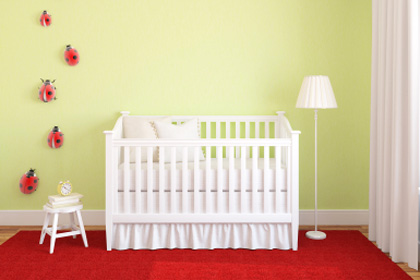 There's nothing like having a baby to get you worrying about the future of the planet. Going green gets personal when it's your own child who will inherit the earth. But how do you fit all of those baby necessities into an eco-friendly lifestyle? For parents who want to protect the planet -- and their babies from chemicals and additives -- there are a few simple things to consider.
There's nothing like having a baby to get you worrying about the future of the planet. Going green gets personal when it's your own child who will inherit the earth. But how do you fit all of those baby necessities into an eco-friendly lifestyle? For parents who want to protect the planet -- and their babies from chemicals and additives -- there are a few simple things to consider.
The bottom line
A great place to start looking at your baby's environmental impact is at his or her bottom. The great diaper debate still hasn't been settled scientifically, but many parents who choose cloth diapers say they do so at least partially because of environmental concerns. Kristen Hutchinson of West Seattle is one such parent. "There are many reasons people choose cloth: finances, environmental concerns, health issues, and others," she says. "Mostly, I was concerned about the chemicals and gels used in most disposables, and I didn't want to send all that waste to the landfill!"
Baby's Bottom Line in Seattle's Queen Anne neighborhood offers many different kinds of cloth diapers and accessories. Owner Susan Cavanagh says, "Using cloth diapers is not as difficult as you might think." She should know. She's also a mother of four children, all of whom wore cloth diapers. She often meets with new parents to help them evaluate their diaper options and choose the best product for their needs. "When you choose eco-friendly products," Cavanagh says, "remember you're not only making an investment in your child's current health and happiness, but in their future as well."
Organic fabrics
Many cloth diapers and other clothing items are made from organic materials such as cotton. This might not seem very important in the scheme of things; after all, your baby's not going to be eating them! But the Sierra Club says it takes one-third of a pound of chemicals to produce enough non-organic cotton for just one adult-size T-shirt. And according to the Worldwatch Institute, cotton growing uses 25 percent of all insecticides produced annually, including several known human carcinogens. Sarah Lane, co-owner of ProgressiveKid on Bainbridge Island, says, "Organic cotton products provide peace of mind from knowing that cotton harvesters didn't get cancer-causing toxins on their skin, satisfaction that rivers and groundwater didn't become poisoned by the enormous toxic runoff of non-organic cotton farms, and reassurance that the people who worked to produce the product all made a living wage."
For some parents, those added benefits are more than enough to justify the higher cost of products made from organic materials. "We chose organic cotton because it is grown without the use of harsh chemicals and is better for baby skin," says Robin Magonegil of Seattle.
Beth Burrows of Edmonds recently purchased an organic cotton onesie as a gift. "I consider that every ounce of care should go into choosing anything for babies and children," she says. "For me, part of that care is buying organic."
Natural ingredients
Many parents also insist on using baby skin care products that are 100 percent natural. "Some of the leading national brands contain harsh ingredients such as a formaldehyde-releasing preservative, a synthetic carcinogenic antioxidant, and lye," says Laura Burgess, owner of Babeez, a Duvall maker of skin care products. Burgess has created a line of products she says are free of sulfate, talc, toxins and fillers, and use naturally derived ingredients, such as shea butter and almond oil.
None of us can reduce our environmental impact to zero or avoid all of the chemicals and additives out there. But we can all make minor adjustments to improve the health of our families and our planet, and those small changes may add up. In two short years, Lane says, the availability of eco-friendly products has soared, and the prices for those products have steadily decreased. "It is time for people to make informed choices that take into consideration more than just their budgets," she says. "They must also consider their health, the health of their children and the health of the planet."
Laurie Thompson is a freelance writer and mother of two.









